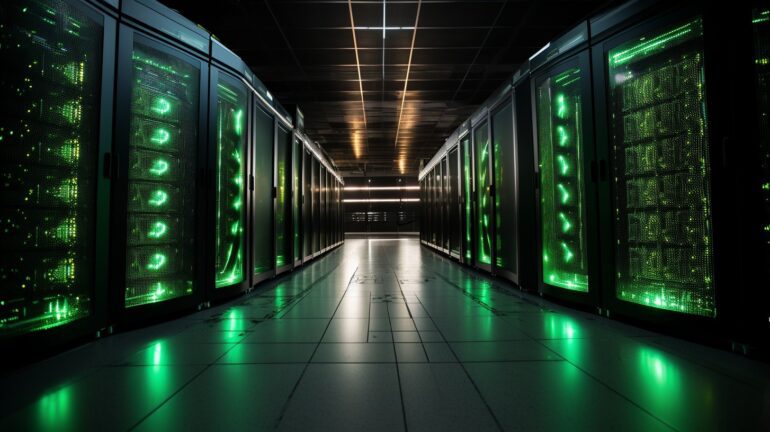TL;DR:
- The Commission and EuroHPC JU are expanding access to EU supercomputers for European AI start-ups and SMEs.
- A part of the EU AI Start-Up Initiative, this move aims to accelerate AI model development by reducing training time.
- President von der Leyen’s announcement during the AI Alliance Assembly underscores the strategic importance of this initiative.
- European AI and HPC players will collaborate to boost innovation and global competitiveness.
- Europe currently boasts three world-class supercomputers, with plans for exascale supercomputers.
- Initiatives include a Large AI grand challenge, increased access to supercomputing capacity for ethical AI start-ups, and enhanced HPC-powered services.
- Proposed changes to regulations will ensure sustainable access to European supercomputer capacity.
Main AI News:
In a decisive move, the Commission and the European High-Performance Computing Joint Undertaking (EuroHPC JU) have committed to a strategic initiative aimed at democratizing access to Europe’s cutting-edge supercomputing resources, ushering in a new era for European artificial intelligence (AI) endeavors. This groundbreaking endeavor is a pivotal facet of the EU AI Start-Up Initiative, which seeks to empower European AI start-ups, SMEs, and the broader AI community. The primary objective? To expedite the development and scalability of AI models by providing them with access to world-class supercomputers that can dramatically reduce the training and testing times from months or years to mere weeks.
This remarkable development was officially announced during the fourth AI Alliance Assembly held in Madrid, marking a significant milestone following President von der Leyen’s 2023 State of the Union address. European AI and high-performance computing (HPC) players are poised to embark on a closely-knit collaboration to foster groundbreaking innovations and bolster the competitiveness of the European AI industrial landscape. In effect, this alliance is set to propel the rapid evolution of AI technology, positioning the European Union as a formidable global leader in the field.
President Ursula von der Leyen emphasized the importance of harnessing Europe’s supercomputing capabilities, stating, “Europe is a leader in supercomputing, thanks to the investments we made in recent years. We have three state-of-the-art supercomputers in the EU. And we need to put this power to use. The access to Europe’s supercomputing infrastructure that we are announcing today will help start-ups lead the development and scale-up of artificial intelligence in a responsible manner and in line with European values.“
At present, the European Union stands at the forefront of the global supercomputing arena. Its trio of world-class supercomputers – LEONARDO, LUMI, and MareNostrum5 – is a testament to the remarkable strides made by the EuroHPC JU. With the imminent expansion of EuroHPC JU’s capabilities to exascale performance and beyond, spearheaded by the JUPITER and JULES VERNE consortium exascale supercomputers, Europe is poised to wield even more formidable power in the realm of AI model development and training.
The next steps in this transformative journey involve the active participation of EuroHPC Joint Undertaking’s member states, backed by the support of the European Commission. Their collective efforts will drive research, development, demonstration, and deployment endeavors related to the European supercomputing infrastructure. This commitment is aligned with the overarching goal of the European Union to establish a global AI ecosystem that is not only cutting-edge but also trustworthy and responsible.
Key initiatives under this commitment include the launch of the Large AI grand challenge, a collaborative competition led by the EU-funded project AI-BOOST. European start-ups experienced in large-scale AI models are encouraged to participate, with the promise of gaining access to EuroHPC supercomputing facilities. The competition seeks to identify up to four promising European AI start-ups, offering them a substantial €1 million prize and the opportunity to develop large-scale AI models in Europe, ultimately releasing them under an open-source license for non-commercial use or sharing their research findings with the wider community.
Additionally, European supercomputer capacity will be made available to ethical and responsible AI start-ups, streamlining their model training processes and promoting efficiency. The EuroHPC JU will also intensify its activities and services bolstered by High-Performance Computing, fostering the growth of trustworthy AI across Europe. These efforts aim to enhance accessibility for AI communities and maximize the effective utilization of HPC technologies for scientific and industrial innovation.
Furthermore, as part of the 2024 Commission Work Programme, proposed changes to the Regulation on the EuroHPC Joint Undertaking will ensure sustainable and enduring access to European supercomputer capacity, solidifying the foundation for the continued growth of European AI start-ups. This monumental initiative signifies a bold step forward in unleashing the true potential of AI technology, marking the European Union as a formidable force in the global AI landscape.
Conclusion:
This strategic initiative signifies a substantial leap forward for the European AI market. Granting wider access to supercomputing resources not only accelerates AI model development but also strengthens Europe’s position as a global AI leader. The collaborative efforts and initiatives announced pave the way for increased innovation, competitiveness, and trustworthiness within the European AI ecosystem, making it an attractive hub for AI-driven businesses and startups.

